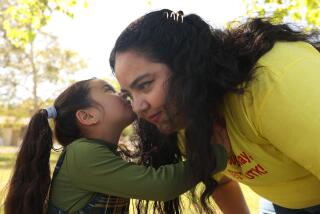Tying Shoe May Not Put Young Scholar Off on Right Foot
- Share via
I hadn’t talked to my friend in about a month, so we were catching up.
I asked about his son, who’s not quite 3 years old.
“Oh, Daniel’s getting ready to take his PSATs,” he said.
I asked what he meant because surely it couldn’t be what I had just heard. Last time I checked, Daniel was heavily into Peter Pan.
“You know, the PSAT ,” my friend said. “The Preschool Scholastic Aptitude Test.”
This is not quite a joke. My friend lives in New York City. As of late, he and his wife have been interviewing with a lot of preschool directors. That is, the preschool directors have been interviewing them.
My friends are hoping that one of the preschools of their choice will deign to accept their child, a wonderful, bright little boy. But is he any more wonderful than the other children? This is cause for concern.
So my friends take these interviews seriously, although not too seriously. They remind themselves to smile. They want to make sure that the preschool directors see that Daniel comes from a good family, with parents who have nice teeth.
Then there’s my sister. She too has a wonderful, bright little boy. Only there’s a problem. He was born in September, late September. That means that by the time he turns 5, many kids in his kindergarten class will be edging up on 6.
This is not good. Her son could be at a disadvantage, or so his preschool teacher says. Consequently my sister is mulling over the possibility of holding him back. Lord knows, the competition is tough enough as it is.
This is happening a lot, among those of a certain means, in certain neighborhoods, where the question posed is not, “Can Johnny read?” but “Can he read better than the kid down the street?”
Parents are searching for an edge. Their children, they believe, will thank them for that in due time.
There is nothing wrong with this, of course, unless we are talking about extremes.
Todd Marinovich, the USC quarterback charged with possessing cocaine, may or may not be an extreme. Depending on your point of view.
Some parents think it is perfectly normal, even highly commendable, to push their child to be the best that they want him to be. Besides, says dad Marv Marinovich, Todd always liked football, even before he learned how to walk.
Others are aghast. They say let a kid be just that. They grow up too fast as it is.
Somewhere in all this one hopes there is a right path.
The other night, my husband and I heard an educational specialist speak at our daughter’s preschool. The preschool director said she had convened us all because she knew we were facing one of the most “traumatic” decisions that a parent can make: whether or not to send our child to kindergarten.
The truth was that until I heard this educational specialist speak, I had no idea how traumatized I should be.
The specialist told us that if we send our child to kindergarten before she is ready, she is very likely to “fall apart” by first grade. Second and third grade, of course, would be even worse.
And the list of “at risk” children was long. Boys are in for the worst, but essentially any child born after June could be in for a rocky road.
I looked at the faces of the parents around me. I was the only one wearing even a hint of a smile.
Which I take to mean that all of this is pretty serious stuff.
To laugh it off, it seems, could be to imperil your child. And I’ve since asked around. Just about everybody has stories about parents who have made the wrong choice . The consequences sound bleak.
“Things are a lot different than when we went to school,” Frank Carden, director of the health psychology department at Children’s Hospital of Orange County, told me over the phone. Then he talked about the pros and the cons connected with parents pushing their child to succeed.
“But it lets me stay in business,” he said. Then he laughed, and I managed to--sort of--myself.
So, right. Education today is a whole different ball of wax. Today there are sophisticated tests and studies. Today they have educational specialists who speak at preschools. Today consultants will “assess” your child, for a fee.
In hindsight, I guess I’m lucky that my kindergarten days were as carefree as they were. With a November birthday and no preschool, today I’d definitely be considered “at risk.” What I remember about back then was that we took a lot of naps.
But then again, in those days the criteria for kindergarten entrance were lax. We were supposed to be able to tie our shoes.
I remember my mother trying to teach me, and trying, again and again. No such thing as Velcro then. I couldn’t do it, so she showed me the easy way out: make two loops and tie them in a knot. I did it, and I got in. I was 4 years old.
“I don’t know what to do,” my sister was saying the last time we were talking about the kindergarten bind. “I keep thinking that whatever I decide to do, it’s going to affect him for the rest of his life.”
Which, of course, it might.
Just watch me tie my shoes. Two loops and a knot. It works every time.






